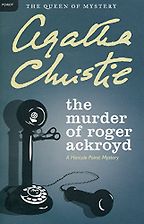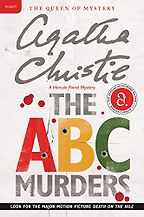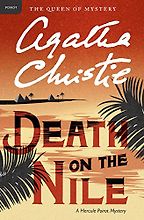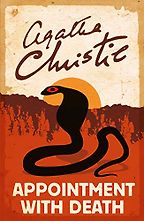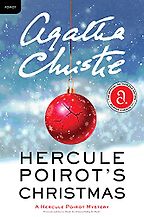The Best Hercule Poirot Books
Last updated: April 09, 2025
Hercule Poirot first appeared in Agatha Christie's The Mysterious Affairs at Styles in 1921. He is already apparently past his prime, described as having a limp but having been "in his time one of the most celebrated members of the Belgian police." He then stays much the same age over the course of the next four decades, maintaining great pride in his moustache and his neat appearance.
In addition to making little comments in French, he also continues to use French turns-of-phrase, even when he is speaking English ("All my excuses for having deranged you," he says to a lawyer in The Murder of Roger Ackroyd. "The word derange," the doctor who narrates the story tells him, "is applicable to mental disorder only.") During World War I Agatha Christie served as a volunteer nurse at a hospital in Torquay, where she met Belgian refugees—possibly what gave her the idea.
Poirot's last appearance is in Curtain, published in 1976, but written in the 1940s. Christie was already completely fed up of Poirot by then and had tried to finish him off. However, "her agent and publisher persuaded her to put it in a drawer and it wasn’t published for 30 years," her grandson told us.
If you love Agatha Christie, you'll want to read all of them, but if you're only interested in some of the best, here are all the Hercule Poirot books that have been recommended on Five Books:
See also Best Agatha Christie books. For more recent books, please consult our best mystery books of 2024 list.
The Mysterious Affair at Styles (1921)
by Agatha Christie
The Mysterious Affair at Styles was not only the first mystery book Agatha Christie wrote, it's also the first one featuring her most popular detective, Hercule Poirot. The novel is set at a country house in the English countryside called Styles, where the narrator, Captain Hastings, is staying with an old friend. Poirot is one of seven Belgian refugees who has been taken in in a nearby village.
“This novel created a huge amount of publicity and discussion when it first came out because Christie did something that just broke every rule in the mystery genre playbook. . . . I come down on the side of the group that says it was a brilliant move. It was audacious.” Read more...
David Baldacci, Novelist
“Agatha Christie is one of the very few people to have sold more unabridged audiobooks than abridged ones. That says something about the quality of her writing and the difficulty of abridging detective stories. You can’t leave out the red herrings. Hugh Fraser reads it wonderfully. In many ways, it’s the most complicated challenge Poirot faced. When you come to the end, you really do put down the book and say to yourself: ‘Why on earth didn’t I think of that?’” Read more...
“A lot of people love the later Christie, I like the early ones. This one is from 1936. It’s set at an archaeological dig. There’s a plan of the dig and where everyone’s rooms are. I don’t want to ruin it for anybody, but it’s quite a neat solution. It’s a good problem-solving one…It’s a good setting. It’s a finite group of people who are suspects. I like the way it’s written. Her framing devices are really good—there’s not just a straightforward narrator. I love Hercule Poirot more than Miss Marple. I think Poirot is a more interesting figure. And I do have a fondness for the dramatic resolution. The ‘I’ve gathered you all in the room together and this is when I point the finger at the person who did it.’ The neatness of it is really appealing.” Read more...
Stig Abell, Journalist
Death on the Nile (1937)
by Agatha Christie
Agatha Christie wrote dozens of mysteries with twisty plots, but Death on the Nile must rank as among her best. It's a touching story, almost believable, and the setting on the Nile in Egypt atmospheric. She herself stayed at the Old Cataract Hotel in Aswan, the starting point, in the book, for the paddleboat cruise down the Nile which inevitably ends in murder. The audiobook version, narrated by David Suchet—who played Hercule Poirot in many BBC adaptations and so for many people is Hercule Poirot—is just under 8 hours and ideal listening for family car journeys.
“It’s a great set-up for a mystery that draws directly from Christie’s own experience of travelling in the Middle East. She was very familiar with that area, so the setting is very precise and well described, you really feel like you are there. And there’s this undercurrent of evil; she’s exploring the idea of how a disturbed and disturbing personality in a family can trickle down the generations. This woman who’s been murdered is truly horrible. She’s really done a number on her children. All together, this makes for a great mystery and it deserves to be more widely known.” Read more...
Caroline Crampton, Memoirist
“She has a very good plot with some good clueing and misdirection. It’s a good mystery in a country house setting, at Christmas. What more could you want but a murder? That murder involves an apparent impossibility.” Read more...
Martin Edwards, Literary Scholar
“The reason I picked Mrs. McGinty’s Dead is because it’s a personal favourite of mine. Poirot is my favourite of her fictional detectives, and the setup to this one is so good. What we have is Poirot called in by his friend Superintendent Spence to look into the case of a young man called James Bentley, who is accused of murdering his housekeeper, the titular Mrs. McGinty. Bentley is condemned to be executed, but Spence is not convinced of the man’s guilt, and so Poirot is summoned to this small village to try and pick apart the mystery and the circumstances that led to Mrs. McGinty’s death. The really irresistible gimmick that I absolutely love is the early revelation that Poirot makes when he discovers that Mrs. McGinty, in the days before her death, had clipped a newspaper article in which three mysterious women are discussed. These three women were involved in three separate murder cases and their fates are a mystery. Nobody knows what has become of these women.” Read more...
The Best Locked-Room or Puzzle Mysteries
Tom Mead, Thriller and Crime Writer

